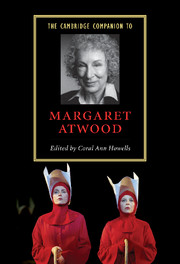Book contents
- Frontmatter
- Introduction
- 1 Margaret Atwood in her Canadian context
- 2 Biography/autobiography
- 3 Power politics: power and identity
- 4 Margaret Atwood’s female bodies
- 5 Margaret Atwood and environmentalism
- 6 Margaret Atwood and history
- 7 Home and nation in Margaret Atwood’s later fiction
- 8 Margaret Atwood’s humor
- 9 Margaret Atwood’s poetry and poetics
- 10 Margaret Atwood’s short stories and shorter fictions
- 11 Margaret Atwood’s dystopian visions: The Handmaid’s Tale and Oryx and Crake
- 12 Blindness and survival in Margaret Atwood’s major novels
- Further Reading
- Index
2 - Biography/autobiography
Published online by Cambridge University Press: 28 November 2006
- Frontmatter
- Introduction
- 1 Margaret Atwood in her Canadian context
- 2 Biography/autobiography
- 3 Power politics: power and identity
- 4 Margaret Atwood’s female bodies
- 5 Margaret Atwood and environmentalism
- 6 Margaret Atwood and history
- 7 Home and nation in Margaret Atwood’s later fiction
- 8 Margaret Atwood’s humor
- 9 Margaret Atwood’s poetry and poetics
- 10 Margaret Atwood’s short stories and shorter fictions
- 11 Margaret Atwood’s dystopian visions: The Handmaid’s Tale and Oryx and Crake
- 12 Blindness and survival in Margaret Atwood’s major novels
- Further Reading
- Index
Summary
Margaret Atwood's relation to biography and autobiography has been the subject of much controversy. Like many writers, she steadfastly resists attempts to read her works as simple reflections of personal experiences; they are, as she constantly reminds her readers, artistic creations that may draw upon but not be reduced to observed experience. Another Canadian writer, Alice Munro, put the case memorably when she observed that writers often use a bit of starter dough from the real world, but the cake that rises from the pan is, of course, another confection altogether. This chapter will not, therefore, consist of any such attempt to read Atwood's works biographically, as fictionalized autobiography. Instead, it will ponder representations of Atwood and her career, and it will use the notion of literary celebrity to do so.
There is no doubt that Atwood is the one Canadian writer who can, most unequivocally, be called a literary celebrity, and this chapter will assess not only how she has been represented as such, but how she has intervened as an active, canny agent to shape the discourses surrounding her celebrity. It may, at first glance, seem out of proportion to call any writer a celebrity, given the sort of attention that Hollywood A-list stars attract, but theorists of celebrity see it as a phenomenon that reaches across cultural institutions. As Christine Gledhill writes, the star “crosses disciplinary boundaries.”
- Type
- Chapter
- Information
- The Cambridge Companion to Margaret Atwood , pp. 28 - 42Publisher: Cambridge University PressPrint publication year: 2006
- 1
- Cited by



